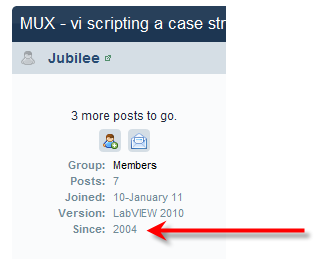-
Posts
2,397 -
Joined
-
Last visited
-
Days Won
66
Content Type
Profiles
Forums
Downloads
Gallery
Posts posted by jgcode
-
-
It provides no benefit as you say to the end user of the package.
No, I was actually saying that I did not know what the benefits are (having not used this feature, nor LabVIEW 2010 a lot).

-
As for OpenG - that feature would require LabVIEW 2010. The next upgrade of the libraries are for 2009. So this question may pop up in the future (although given the feedback here on LAVA it seems that this feature needs some work).
As for packages in general - end users install a package which contains dist code. They do not check in and out the code etc. I am not sure how this would affect the end user? Would it help with builds? Etc.
I would like to see a discussion of the benefits here.
-
I see that Daklu has finally managed to hack into Shaun's account.

Lol
I think ShaunR is safe here given that he responded based on the thread title as opposed to recommending it as a prefferred solution.

-
Yer, MP does not support all of the same special characters as regex, so I too jump between them for speed or functionality to meet requirements.
ShaunR - how do you know so much about the LabVIEW internals on these functions (which is great btw)?
-
 1
1
-
-
Looks like I spoke too soon. Based on some beta feedback, and after discussing the issue further in-house, I will not be including these VIs in 2011. Hopefully, we'll see native support for the error terminals on the primitives themselves in a future LabVIEW version.
Time for another campaign?

-
What are the new options for maintaining your CLA? I can't seem to find anything about that.
You do a multiple choice for a CLA recert. There is an example exam on the web.
-
See my response on the NI forum.
I subscribed to both forums, but I agree its probably best to keep the thread going over there rather than start here.
-
Should LabVIEW Service Packs be a separate install and not an upgrade?
I want to highlight this thread on the darkside as I think it is very interesting and would like to hear what others think here on LAVA.
vadym']"We do ask for activation for SP1 because it is considered a separate release."Well, if so, it should be installd in a separete place.
Othervice, I had to uninstall SP1 and reinstall LV2010, just becouse my lic expired and SP1 overwrite my working LV2010.
Never had this problem before... confused by this update.
It you consider it as a separate release, make it SEPARETE. But not overwriting my working LV2010 to find out I can't use it after.
Vadym
[/color]Please discuss.
-
-
You can track this bug here: ID: 3275738
...or if this work is already in progress...Kudos for your optimism

How does one go about requesting, the package to be updated or offering help to get packages update ?
I have added your post to the bug tracker, its in the system now, which is better than before

-
You can track this bug here: ID: 3275381
-
You can track this bug here: ID: 3275377
-
You can track this bug here: ID: 3275359
-
You can track this bug here: ID: 3275356
-
You can track this bug here: ID: 3275351
-
You can track this bug here: ID: 3275344
-
You can track this bug here: ID: 3252254
-
Word.
You can track this new feature here: ID: 3275249
-
Congrats to John Lokanis for passing his CLA! - well done mate!

-
I am in the process of debugging an issue that only shows up on a built application. Obviously the Desktop Execution Trace Toolkit is ideal for the job particularly after I sprinkle in some user defined messages. The question comes on the heels of my realizing that some of these messages needed to be placed in our re-use library VI's. For long term I can see where making these custom messages part of the re-use library could be useful should future issues arise but what is the unforeseen impact of leaving these messages in? Is there any worth worrying about?
Jason
I guess the question I have here is that if a reuse library is tested and vetted code then why does it need DETT calls in it all time or is the dist version? (There may be a logical answer I am missing here).
Anyways, I try and keep my reuse VIs lightly coupled. DETT is an add-on toolkit ($$) so sharing your VIs could be an issue however, if its company standard to have DETT always installed then this might not be a big deal internally.
Cheers
-JG
-
So it seems the summary is to use a higher version if you can, but 8.2.1 is better than 8.2
Also, here is the versions to use that relate to your original questions:
- dynamic dispatch recursion (as in reentrant dynamic VIs - LabVIEW 8.5)
- properties (as in property nodes - LabVIEW 2010)
- friends and community scope (LabVIEW 2009)
-
Also study gcode's project template. You will probably want to do some better error handling especially when dealing with comm ports and the fact that your device may or may not even be on. The error module in that project will work very well for you.
Well, this is just an example template I use for teaching taken from NI Intermediate 1.
Thought it may help in this case to describe exactly what you were talking about (using user event to communicate and error from consumer to producer).
Cheers
-JG
-
I think 8.2 also had issues building EXEs that contained LVOOP classes that used dynamic dispatching (name collision issues) - I recall having to have my classes in specific destination folders outside of the exe (pretty sure that was in 8.2).
Good points.
It wasn't until LV2009 that the AB had a makeover and due to a new internal file/folder layout, file collisions do not occur and are not stored outside of the EXE (looks real messy for clients).
Now I may be smoking crack here, but I was under the impression that you couldn't built an EXE that contained LVOOP in 8.2 due to a number of issues (may it was certain features?) - you have to use 8.2.1? I tried googling and found this. Of course AQ would know best.
-
Eitherway, I'm anxiously anticipating getting my results back so I can schedule my next attempt at it.
Hey... ...that's confidence!

I am sure you will be fine, the exam feels harder than it is to pass IMHO.
I'm curious, how are other people preparing for the CLA, besides of course the sample exam?I prepared by having a game plan, I mean if you are designing and coding as part of your job, you should be getting all the practice you need, right (except for the fact you don't have access to your tools, templates and reuse code etc...)?
I had a chat to Omar before taking the exam and he summed it up best for me: Quite simply, start at a high level and get the framework down, then iterate over it as many times as you can adding detail (code or requirements) keeping in mind you don't have to code it - that's not the point of the exam. So I pretty much followed this top-down approach and it works well.
Cheers
-JG




Strange crosses in the palette
in Development Environment (IDE)
Posted
I filed the original CAR and thus Mike contacted me. It should be fixed in 2011.